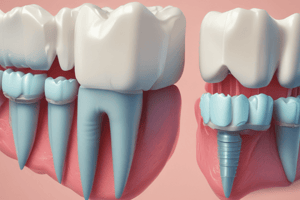Podcast
Questions and Answers
What is the primary factor that affects the treatment outcome in patients with severe periodontitis?
What is the primary factor that affects the treatment outcome in patients with severe periodontitis?
What is the prognosis for well-controlled diabetics with slight-to-moderate periodontitis who comply with their recommended periodontal treatment?
What is the prognosis for well-controlled diabetics with slight-to-moderate periodontitis who comply with their recommended periodontal treatment?
What is the effect of subgingival margins on periodontal diseases?
What is the effect of subgingival margins on periodontal diseases?
Why are electric toothbrushes helpful for patients with certain systemic diseases?
Why are electric toothbrushes helpful for patients with certain systemic diseases?
Signup and view all the answers
What is the relationship between diabetes and periodontitis?
What is the relationship between diabetes and periodontitis?
Signup and view all the answers
What is the primary role of genetic factors in periodontal diseases?
What is the primary role of genetic factors in periodontal diseases?
Signup and view all the answers
What is the impact of smoking on the prognosis of patients with periodontitis?
What is the impact of smoking on the prognosis of patients with periodontitis?
Signup and view all the answers
What is the effect of plaque and calculus on periodontal diseases?
What is the effect of plaque and calculus on periodontal diseases?
Signup and view all the answers
What is the prognosis for patients with severe periodontitis who stop smoking?
What is the prognosis for patients with severe periodontitis who stop smoking?
Signup and view all the answers
What is the benefit of well-contoured, supragingival margins?
What is the benefit of well-contoured, supragingival margins?
Signup and view all the answers
Study Notes
Prognosis of Tooth Mobility
- Tooth mobility caused by inflammation and trauma from occlusion may be correctable.
- Tooth mobility resulting from loss of alveolar bone is not likely to be corrected.
Prognosis for Patients with Gingival Disease
- Biofilm-induced gingivitis is a reversible disease that occurs when bacterial biofilm accumulates at the gingival margin.
- The prognosis is good for patients with biofilm-induced gingivitis.
- Systemic factors, such as endocrine changes, blood dyscrasias, and medications, can influence the inflammatory response and affect the prognosis.
- The long-term prognosis depends on control of bacterial biofilm and correction of systemic factors.
Biofilm-Induced Gingival Diseases Modified by Medications
- Medications, such as phenytoin, cyclosporine, and nifedipine, can cause drug-influenced gingival enlargement.
- The long-term prognosis depends on whether the etiology of the inflammation can be eliminated or the patient's systemic problem can be treated with an alternative medication.
Non–Biofilm-Induced Gingival Lesions
- Non-biofilm-induced gingivitis can be caused by bacterial, fungal, and viral infections.
- The prognosis depends on elimination of the source of the infectious agent.
- Dermatologic disorders, such as lichen planus, pemphigoid, and lupus erythematosus, can manifest in the oral cavity as atypical gingivitis.
- The prognosis is linked to management of the associated dermatologic disorder.
Prognosis for Patients with Periodontitis
- Chronic periodontitis is a slowly progressive disease associated with local environmental factors.
- The prognosis is generally favorable for patients with slight to moderate periodontitis, provided the inflammation can be controlled through good oral hygiene and removal of local biofilm-retentive factors.
- Patients with severe periodontitis, furcation invasion, and tooth mobility may have a questionable or unfavorable prognosis.
- Aggressive periodontitis can present in a localized or generalized form, and the prognosis may be poor to hopeless.
- Smoking cessation can affect the treatment outcome and improve the prognosis.
Systemic Disease or Condition
- The patient's systemic background affects overall prognosis, and the prevalence and severity of periodontitis is significantly higher in patients with diabetes.
- Well-controlled diabetics with slight-to-moderate periodontitis who comply with their recommended periodontal treatment should have a good prognosis.
- Conditions that limit the patient's performance of oral procedures, such as Parkinson's disease, can adversely affect the prognosis.
Genetic Factors
- Genetic factors may play an important role in determining the nature of the host response in periodontal diseases.
Plaque and Calculus
- The microbial challenge presented by bacterial plaque and calculus is the most important local factor in periodontal diseases.
Subgingival Restorations
- Subgingival margins may contribute to increased plaque accumulation, increased inflammation, and increased bone when compared with supragingival margins.
- Discrepancies in these margins, such as overhangs, can negatively impact the periodontium.
- Subgingival margins have a poorer prognosis than teeth with well-contoured, supragingival margins.
Studying That Suits You
Use AI to generate personalized quizzes and flashcards to suit your learning preferences.
Description
This quiz covers the factors affecting tooth mobility and the overall prognosis in dentistry, including bone levels, attachment levels, and the possibility of saving teeth. It touches on the impact of inflammation, trauma, and loss of alveolar bone on tooth mobility.



